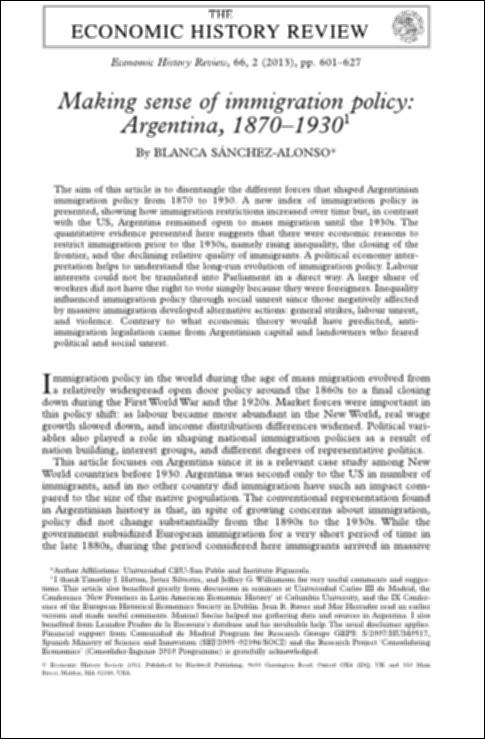Por favor, use este identificador para citar o enlazar este ítem:
http://hdl.handle.net/10637/11783Making sense of immigration policy: Argentina, 1870-1930.
| Título : | Making sense of immigration policy: Argentina, 1870-1930. |
| Autor : | Sánchez Alonso, Blanca |
| Materias: | Migración |
| Resumen : | The aim of this article is to disentangle the different forces that shaped Argentinian immigration policy from 1870 to 1930. A new index of immigration policy is presented, showing how immigration restrictions increased over time but, in contrast with the US, Argentina remained open to mass migration until the 1930s. The quantitative evidence presented here suggests that there were economic reasons to restrict immigration prior to the 1930s, namely rising inequality, the closing of the frontier, and the declining relative quality of immigrants. A political economy interpretation helps to understand the long-run evolution of immigration policy. Labour interests could not be translated into Parliament in a direct way. A large share of workers did not have the right to vote simply because they were foreigners. Inequality influenced immigration policy through social unrest since those negatively affected by massive immigration developed alternative actions: general strikes, labour unrest, and violence. Contrary to what economic theory would have predicted, antiimmigration legislation came from Argentinian capital and landowners who feared political and social unrest. |
| Descripción : | En: Economic History Review. e-ISSN 1468-0289. 2013. v. 66, 2 : 601-627 pp |
| URI : | http://hdl.handle.net/10637/11783 |
| Derechos: | http://creativecommons.org/licenses/by-nc-nd/4.0/deed.es |
| Fecha de publicación : | 17-dic-2013 |
| Centro : | Universidad San Pablo-CEU |
| Aparece en las colecciones: | Facultad de Económicas y CC Empresariales |
Los ítems de DSpace están protegidos por copyright, con todos los derechos reservados, a menos que se indique lo contrario.


